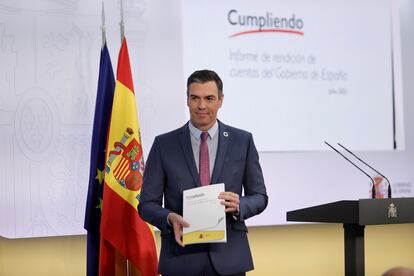Spanish PM Pedro Sánchez: ‘Spain has a gold medal in vaccination’
The Socialist leader celebrates the progress of the country’s immunization drive, which has fully vaccinated more than 26.4 million people

Spanish Prime Minister Pedro Sánchez celebrated the progress of the Covid-19 vaccination drive at a news conference on Thursday to review the government’s performance. Sánchez’s optimistic speech was devoid of self-criticism about the situation in Spain despite the health and economic challenges of the last six months.
“Spain is the nation that has fully vaccinated the largest share of the population out of the 50 largest countries in the world, outstripping the United Kingdom, the United States, France and Germany. For this reason, we could say that we have a gold medal in vaccination,” said the Socialist (PSOE) leader, who heads a coalition government with junior partner Unidas Podemos.
According to the latest figures, 55.7% of the population in Spain is completely vaccinated, equalling 26.4 million people. A total of 31.3 million have at least one dose of a Covid-19 vaccine, or 66% of the population.
📺 @CarolinaDarias ➡️ España es, tras Malta, el país UE con un mayor porcentaje de población con pauta completa #VacunaCOVID19
— Ministerio de Sanidad (@sanidadgob) July 28, 2021
✅El 55,7% de la población tiene pauta completa y el 66% cuenta con, al menos, una dosis. #YoMeVacunoSeguro pic.twitter.com/kYGUGEU0oQ
“We are on the brink of overcoming a cycle in our history that has marked our lives forever, " he continued. “The pandemic has seriously hurt the way of life of almost everyone. We will not forget what has happened nor how we overcame it. Now, an opportunity is opening up to reap the fruits of our efforts and to open up a stage of recovery at all levels.”
During the press conference, the Spanish prime minister also expressed optimism about the country’s economic recovery from the pandemic. “Let me tell you a fact that defines what Spain is: it is a country that is first in vaccination and is leading the forecast of economic growth,” he said.
According to the Spanish Cabinet and the International Monetary Fund (IMF), the Spanish economy is forecast to grow by over 6% in 2021. For next year, the IMF is forecasting that gross domestic product (GDP) will rise by 5.8%. This makes Spain the advanced economy that will expand the most in 2022 after suffering the biggest setback in 2020, when output fell by a record 10.8%, the biggest decline since the Spanish Civil War.
Meanwhile, the fifth wave of the coronavirus in Spain is starting to stabilize. The incidence rate fell on Wednesday for the first time in more than a month and dropped again on Thursday. The 14-day cumulative number of cases per 100,000 inhabitants now stands at 696, down from 699.8 on Wednesday and 702 on Tuesday. Spain’s healthcare system, however, remains under pressure. A total of 9,725 people are in hospital with Covid-19, while 17 in every 100 patients in intensive care in Spain have the disease. Experts have also warned that a downward trend in contagions is unlikely to be seen until mid-August.
Regional summit
Sánchez also spoke about the regional summit that will take place on Friday in Salamanca. The premiers of all Spain’s 17 regions will attend the meeting, with the exception of Catalan leader Pere Aragonès. Asked about the Catalan premier’s absence on Thursday, Sánchez said: “I regret it, it’s a shame.”
The prime minister explained that the summit will address three issues that also affect Catalonia: how the EU recovery funds will be distributed, the joint plans on how to contain the pandemic and the projects underway to address the demographic crisis in the country.
“We have to use this open forum for dialogue and meeting, not for a partisan fight,” said Sánchez, who pointed out that he has held 18 of the 24 regional summits that have ever taken place, while his predecessors only organized six.
The prime minister on Thursday also called on the national leader of the conservative Popular Party (PP), Pablo Casado, to facilitate the renewal of state bodies such as the General Council of the Judiciary (CGPJ), the Data Protection Agency and the Ombudsman. Under current legislation, appointments require a qualified majority of three-fifths of lawmakers in both chambers of parliament – support which Sánchez’s minority government does not have on its own.
English version by Melissa Kitson.
Tu suscripción se está usando en otro dispositivo
¿Quieres añadir otro usuario a tu suscripción?
Si continúas leyendo en este dispositivo, no se podrá leer en el otro.
FlechaTu suscripción se está usando en otro dispositivo y solo puedes acceder a EL PAÍS desde un dispositivo a la vez.
Si quieres compartir tu cuenta, cambia tu suscripción a la modalidad Premium, así podrás añadir otro usuario. Cada uno accederá con su propia cuenta de email, lo que os permitirá personalizar vuestra experiencia en EL PAÍS.
¿Tienes una suscripción de empresa? Accede aquí para contratar más cuentas.
En el caso de no saber quién está usando tu cuenta, te recomendamos cambiar tu contraseña aquí.
Si decides continuar compartiendo tu cuenta, este mensaje se mostrará en tu dispositivo y en el de la otra persona que está usando tu cuenta de forma indefinida, afectando a tu experiencia de lectura. Puedes consultar aquí los términos y condiciones de la suscripción digital.








































